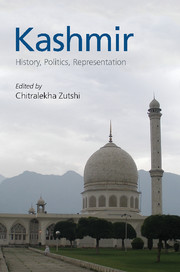Book contents
- Frontmatter
- Dedication
- Contents
- Acknowledgements
- Map 1 Pre-Partition Jammu and Kashmir
- Map 2 Contemporary Kashmir
- Introduction: New Directions in the Study of Kashmir
- PART I HISTORY
- PART II POLITICS
- 5 Azad Kashmir: Integral to India, Integrated into Pakistan, Lacking Integrity as an Autonomous Entity
- 6 ‘Not Part of Kashmir, but of the Kashmir Dispute’: The Political Predicaments of Gilgit-Baltistan
- 7 Law, Gender and Governance in Kashmir
- 8 ‘Survival Is Now Our Politics’: Kashmiri Pandit Community Identity and the Politics of Homeland
- 9 Beyond the ‘Kashmir’ Meta-Narrative: Caste, Identities and the Politics of Conflict in Jammu and Kashmir
- 10 Contested Governance, Competing Nationalisms and Disenchanted Publics: Kashmir beyond Intractability?
- PART III REPRESENTATION
- Contributors
- Index
8 - ‘Survival Is Now Our Politics’: Kashmiri Pandit Community Identity and the Politics of Homeland
from PART II - POLITICS
Published online by Cambridge University Press: 03 August 2019
- Frontmatter
- Dedication
- Contents
- Acknowledgements
- Map 1 Pre-Partition Jammu and Kashmir
- Map 2 Contemporary Kashmir
- Introduction: New Directions in the Study of Kashmir
- PART I HISTORY
- PART II POLITICS
- 5 Azad Kashmir: Integral to India, Integrated into Pakistan, Lacking Integrity as an Autonomous Entity
- 6 ‘Not Part of Kashmir, but of the Kashmir Dispute’: The Political Predicaments of Gilgit-Baltistan
- 7 Law, Gender and Governance in Kashmir
- 8 ‘Survival Is Now Our Politics’: Kashmiri Pandit Community Identity and the Politics of Homeland
- 9 Beyond the ‘Kashmir’ Meta-Narrative: Caste, Identities and the Politics of Conflict in Jammu and Kashmir
- 10 Contested Governance, Competing Nationalisms and Disenchanted Publics: Kashmir beyond Intractability?
- PART III REPRESENTATION
- Contributors
- Index
Summary
Introduction
This chapter analyses the politicization of Kashmiri Pandit collective identity in the 1990s, a period when the majority of Kashmiri Pandits living in the Kashmir Valley left the region at the onset of the armed resistance movement and relocated to Jammu, Delhi, and other towns and cities throughout India. It specifically demonstrates how the community discourse issued by Kashmiri Pandit associations across the decade reflected and refracted the right-wing majoritarian projects of the saffron wave of Hindu nationalism in India. It also highlights the ways in which this community discourse sought to constitute and constrain the heterogeneous lived experiences of individual Kashmiri Pandits with diverse ways of remembering, negotiating and imagining their relationships to Kashmir. This analysis of the Kashmiri Pandit community discourse draws on a number of sources, including articles in daily newspapers and weekly magazines, community publications such as white papers and human rights reports, collections of essays written by Kashmiri Pandit scholars and personal interviews with community leaders during my anthropological fieldwork in New Delhi from 1998 to 2000.
The dynamics described in this essay have deepened and developed since the time it was first written. Kashmiri Pandit community organizations have continued to be closely aligned with Hindu nationalist political movements, especially with the BJP's return to power under the leadership of Prime Minister Narendra Modi in 2014. Panun Kashmir, a Kashmiri Pandit organization discussed in detail later in this chapter that came into existence at the end of 1991, has actively worked to advance its agendas by applying pressure on various public figures and political parties and by demanding state restrictions on cultural expressions that run counter to its vision of Kashmiri priorities, commitments and concerns. For instance, in 2012, Panun Kashmir joined other right-wing organizations in forcing a state ban on a Kashmir seminar featuring the critically acclaimed documentary Jashn-e-Azadi (How We Celebrate Freedom) by filmmaker Sanjay Kak, himself a Kashmiri Pandit, at a college in Pune, Maharashtra.
As in the 1990s, Kashmiri Pandit community associations have continued to mobilize around the issue of return to the homeland in response to various government schemes to develop separate colonies, transit camps and securitized townships for Kashmiri Pandits in the Valley.
- Type
- Chapter
- Information
- KashmirHistory, Politics, Representation, pp. 172 - 198Publisher: Cambridge University PressPrint publication year: 2017



